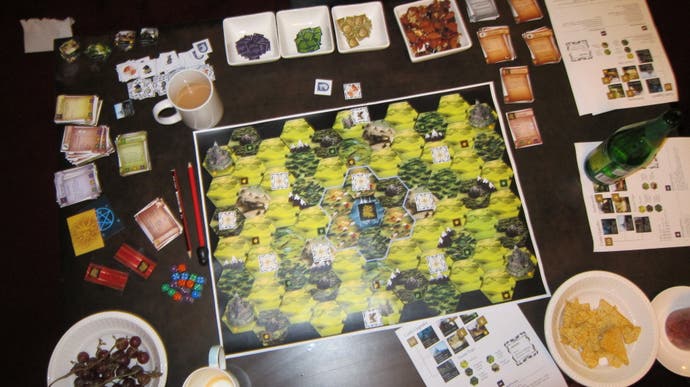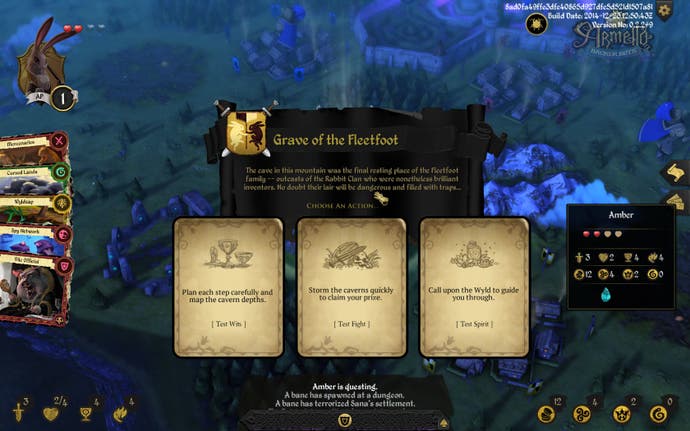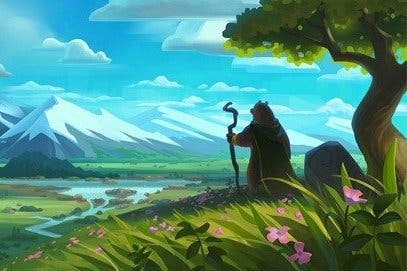Bringing balance to the animals in Armello
Bear with me.
The king is mad. By day he succumbs to the rot that works its way ever deeper into his mind. By night he slumps beneath his cloak, a regal pool, a silken puddle. Every evening, the disease burrows further. Every morning, another decree, crazier, more taxing than the last.
The king is also a lion, incidentally. At least I think he is. I'm not good with animals. Armello is much better with them, however, whether it's this big royal cat, pacing the halls of his castle, or the bunny, the rat, the bear, the wolf, all vying for position in the landscape beyond that castle's walls. The bunny is a dandy, a courtesan with a parasol and ruff. For some reason, I have the bear pegged as a noble layabout, carefully, tactically industrious in that clever way that only the truly lazy have mastered. They all live together in a world of real poise and delicacy. Look at the bright light of magical combat as it ripples off of the coal-black walls of the dungeons. Look at the manner in which each player's turn shifts the sun in the sky further along its invisible rail, making every round a day. Or a night.
Armello is a digital board game, and it's very much the genuine article. It could function as a physical board game - I gather it would slot into your quiet, thematically-organised stacks somewhere near Mage Knight - but it works so much better digitally. The pieces have life and character: they are no longer just pieces, in fact. The maths, while simple, is all taken care of. The king, though? The king is the real reason everything fits to snugly. The king is not just a tumbler of dice and a series of hasty trips back to the rule book to see how many cards get dealt. The king is a real king here - really mad, and really dangerous. "The question for us during development wasn't whether the game would work, because we've been prototyping it on paper for eight months," says the gloriously named Trent Kusters, the founder of developer League of Geeks. "The question was: can we bring a board game to life?"
That's the question Kusters has had to answer, but what about you? What will you do? Kill the king or cure him? The kingdom is up for grabs, and everyone has a shot at it. But what shot should you take?
Armello is hex-based, each tile of the small but wonderfully busy map representing a specific terrain with distinct bonuses and movement penalties. Each player gets three action points per turn, and they can rove around, settling towns for the cash, exploring dungeons for the chance of finding something special, or undertaking quests - head to the flag, read the story, test a skill, and then maybe earn a reward. It's a lot to take in, and the quests give the early game a shape that can sometimes distract you from your ultimate goal if you're not careful. But this is hardly a massive problem: your ultimate goal is right in the center of the map after all, written in the finials and crests of the king's tower. What you're really working out in the early game is how to take that castle - which victory condition to go for. Cure the king? You're going to need spirit stones to fight the rot. Kill the king? You're going to need to punch your way through the palace. Otherwise you can always wait him out - bide your time while the rot eats him up, and then once he's gone, the player with the most prestige points wins.
Balancing these victory conditions is something of an ongoing task. For all its lavish detailing, it can be tricky to keep in mind the fact that Armello is not yet finished. It's in Early Access on Steam, and it's had its first big update over the weekend, adding a new system for putting bounties on players' heads, along with a handful of new cards, and a wealth of AI and netcode improvements. New heroes will be added in the future. Meanwhile, the team has to keep its eye on the king and the ways to topple him. It is harder than it sounds.

"We're still learning," Kusters admits. "One of the biggest feedbacks about the gameplay that really surprised us was how much people are getting prestige victories." Prestige points track your political clout, and are awarded for killing enemies and other players, completing quests, and by playing some of the cards you're dealt throughout the game. "Some people were just flat-out saying: it's impossible to get anything other than a prestige victory. It's the one that's easiest to get your head around and it becomes the default. If you haven't done anything else, you can at least have a prestige victory.
"Currently, there are very deterministic ways to get prestige, too," Kusters continues, and it's clear that, even as he explains the problem to me, in some part of his brain, he's still trying to work out how to fix it. "How you get a spirit stone is far more confusing, for example. Then combat victories are tricky because you get to the palace, and then you trigger the guards, and then it's: augh, how do I ever get enough dice to get the odds to make this thing happen? These are pretty big balancing issues and in our Early Access, we went in knowing that there were major issues in the mid-game, the mid-game that determines your late game."
The solution, as it currently appears to Kusters' team, is to match prestige by making everything more deterministic. "We're currently trying to find more deterministic ways for players to get all the things they need," he explains. "That's what Armello's actually about at its core: exerting your authority and your influence over the RNG, over the random elements in the game. Whether that's the dice, or getting into a game and seeing that the map isn't weighted in your favour. All these things, there are ways to exert more control. Mastery of the game comes from grabbing that slider and pushing it towards more deterministic outcomes. What we're seeing now is players doing amazing things that we'd never imagined. We're seeing the community come up with their own counters to things."
So the game is about fighting entropy? "Yeah, it totally is," Kusters laughs. "It totally is. At the moment we know the players probably don't have enough tools to allow them to do that, but we are working on it."
I am kind of amazed that Kusters can even track what he's working on, to be honest. League of Geeks is a small team - a core of around eight, and then various people scattered around the world, dropping in when their particular skills are needed - and Armello seems disproportionately complex and ambitious. There's combat - PvE and PvP, which sees players rolling dice to do the most damage and ultimately trying to get more dice to roll each time. There are cards which allow you to lay traps, say, or equip items. There's even a card-counting strategy available to you should you know the game well enough to pull it off. In truth, though, Kusters would argue that Armello's apparent breadth has a lot to do with the strategic battles its developers have picked from the off.

"A lot of what people call double-A games seem quite large in scope because they're systems driven," he says. "You only actually need to create a small amount of content and then the systems generate the scenarios and the gameplay and present that content to you in various different ways. We've got the cards that are shuffled, the map's always generated in a different way, there are different characters and the quest lines are dynamic. There's a lot of content for us in terms of cards and animations, but it's still quite a small game. The whole world is already there, and now it's the tweaking and adding of more systems, more emergence."
Armello's so pretty, so clearly the product of careful, measured craft, that it can be hard not to be slightly suspicious of it, in a strange sort of way. Having played it on and off for a week, though, I'm still surprised by the depth, by the intricate web of decisions that are available to you: fight the other players, or stealthily pursue your own goals? Load up on riches, or go straight for the end-game? As I leave Kusters to get back to it, he's pondering what seems to be the key ongoing issue for the developers of this charismatic game: balance.
"We have big discussions about the balance of abstraction here," he tells me. "We had these conversations about combat, say: whether you use dice, or whether you see little numbers popping off people, Advance Wars style. In the end we realised you really have to see dice roll, because for table top games, that concept is very timeless, and very endearing to so many people. Then there's art: we want to find art that doesn't fly too far into the cute Disney camp, and doesn't fly any distance at all into the sexy wolves with six packs camp. In striving for greatness, we're always balancing on a knife edge.
"It's been balance throughout, you know: finding things that evoke table top, but also leaning heavily into the benefits of video games as much as we possibly can too." As Kusters returns to his work, it all comes down to that one crucial question, then: Can League of Geeks bring a board game to life?


